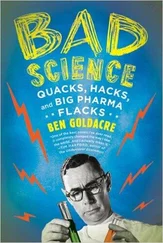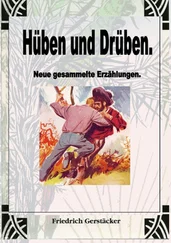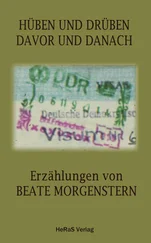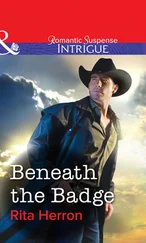Ben Goldacre - Bad Science
Здесь есть возможность читать онлайн «Ben Goldacre - Bad Science» — ознакомительный отрывок электронной книги совершенно бесплатно, а после прочтения отрывка купить полную версию. В некоторых случаях можно слушать аудио, скачать через торрент в формате fb2 и присутствует краткое содержание. Жанр: Публицистика, на английском языке. Описание произведения, (предисловие) а так же отзывы посетителей доступны на портале библиотеки ЛибКат.
- Название:Bad Science
- Автор:
- Жанр:
- Год:неизвестен
- ISBN:нет данных
- Рейтинг книги:5 / 5. Голосов: 1
-
Избранное:Добавить в избранное
- Отзывы:
-
Ваша оценка:
- 100
- 1
- 2
- 3
- 4
- 5
Bad Science: краткое содержание, описание и аннотация
Предлагаем к чтению аннотацию, описание, краткое содержание или предисловие (зависит от того, что написал сам автор книги «Bad Science»). Если вы не нашли необходимую информацию о книге — напишите в комментариях, мы постараемся отыскать её.
Bad Science — читать онлайн ознакомительный отрывок
Ниже представлен текст книги, разбитый по страницам. Система сохранения места последней прочитанной страницы, позволяет с удобством читать онлайн бесплатно книгу «Bad Science», без необходимости каждый раз заново искать на чём Вы остановились. Поставьте закладку, и сможете в любой момент перейти на страницу, на которой закончили чтение.
Интервал:
Закладка:
Now you don’t need these people. Start a blog. Not everyone will care, but some will, and they will find your work. Unmediated access to niche expertise is the future, and you know, science isn’t hard – academics around the world explain hugely complicated ideas to ignorant eighteen-year-olds every September – it just requires motivation. I give you the CERN podcast, the Science in the City mp3 lecture series, blogs from profs, open access academic journal articles from PLOS, online video archives of popular lectures, the free editions of the Royal Statistical Society’s magazine Significance , and many more, all out there, waiting for you to join them. There’s no money in it, but you knew that when you started on this path. You will do it because you know that knowledge is beautiful, and because if only a hundred people share your passion, that is enough.
FURTHER READING AND ACKNOWLEDGEMENTS
I have done my absolute best to keep these references to a minimum, as this is supposed to be an entertaining book, not a scholarly text. More useful than references, I would hope, are the many extra materials available on www.badscience.net, including recommended reading, videos, a rolling ticker of interesting news stories, updated references, activities for schoolchildren, a discussion forum, everything I’ve ever written (except this book, of course), advice on activism, links to science communication guidelines for journalists and academics, and much more. I will always try to add to it as time passes.
There are some books which really stand out as genuinely excellent, and I am going to use my last ink to send you their way. Your time will not be wasted on them.
Testing Treatments by Imogen Evans, Hazel Thornton and Iain Chalmers is a book on evidence-based medicine specifically written for a lay audience by two academics and a patient. It is also free to download online from www.jameslindlibrary.org. How to Read a Paper by Professor Greenhalgh is the standard medical textbook on critically appraising academic journal articles. It’s readable, short, and it would be a best-seller if it wasn’t unnecessarily overpriced.
Irrationality by Stuart Sutherland makes a great partner with How We Know What Isn’t So by Thomas Gilovich, as both cover different aspects of social science and psychology research into irrational behaviour, while Reckoning with Risk by Gerd Gigerenzer comes at the same problems from a more mathematical perspective.
Meaning, Medicine and the ‘Placebo Effect ’ by Daniel Moerman is excellent, and you should not be put off by the fact that it is published under an academic imprint.
There are now endless blogs by like-minded people which have sprung from nowhere over the past few years, to my enormous delight, onto my computer screen. They often cover science news better than the mainstream media, and the feeds of some of the most entertaining fellow-travellers are aggregated at the website badscienceblogs. net. I enjoy disagreeing with many of them – viciously – on a great many things.
And lastly, the most important references of all are to the people by whom I have been taught, nudged, reared, influenced, challenged, supervised, contradicted, supported, and most importantly entertained. They are (missing too many, and in very little order): Emily Wilson, Ian Sample, James Randerson, Alok Jha, Mary Byrne, Mike Burke, Ian Katz, Mitzi Angel, Robert Lacey, Chris Elliott, Rachel Buchanan, Alan Rusbridger, Pat Kavanagh, the inspirational badscience bloggers, everyone who has ever sent me a tip about a story on ben@badscience. net, Iain Chalmers, Lorne Denny, Simon Wessely, Caroline Richmond, John Stein, Jim Hopkins, David Colquhoun, Catherine Collins, Matthew Hotopf, John Moriarty, Alex Lomas, Andy Lewis, Trisha Greenhalgh, Gimpy, shpalman, Holfordwatch, Positive Internet, Jon, Liz Parratt, Patrick Matthews, Ian Brown, Mike Jay, Louise Burton, John King, Cicely Marston, Steve Rolles, Hettie, Mark Pilkington, Ginge Tulloch, Matthew Tait, Cathy Flower, my mum, my dad, Reg, Josh, Raph, Allie, and the fabulous Amanda Palmer.
NOTES
Chapter 1: Matter
2 ‘We sent Alex’: Daily Mirror (4 January 2003)
6 ‘The candles work by’: http://www.bbc.co.uk/wales/southeast/ sites/mind/pages/hopi.shtml
6 ‘a paper published’: Seely DR, Quigley SM, Langman AW. Ear candles – efficacy and safety. Laryngoscope (October1996); 106 (10): 1226–9.
7 ‘a published study’: Ibid.
11 ‘These cleansing and’: Green EC, Honwana A. Indigenous healing of war-affected children in Africa. IK Notes No. 10. Knowledge and Learning Center Africa Region, World Bank Washington (1999), available: http://www.africaaction.org/ docs99/viol9907. htm
Chapter 4: Homeopathy
39 ‘In one study’: Marshall T. Reducing unnecessary consultation – a case of NNT? Bandolier (1997); 44 (4): 1–3
41 ‘But the point of the study’: MacManus MP, Matthews JP, Wada M, Wirth A, Worotniuk V, Ball DL. Unexpected long-term survival after low-dose palliative radiotherapy for non-small cell lung cancer. Cancer (1 March 2006); 106 (5): 1110–16.
46 ‘a very theatrical trial’: Majeed AW et al. Randomised, prospective, single-blind comparison of laparoscopic versus small-incision cholecystectomy. Lancet (13 April 1996); 347 (9007): 989–94.
46 ‘a review of blinding’: Schultz KF, Chalmers I, Hayes RJ, Altman DG. Empirical evidence of bias: Dimensions of methodological quality associated with estimates of treatment effects in controlled trials. JAMA (1995); 273: 408–12
46 ‘review of trials’: Ernst E, White AR. Acupuncture for back pain: a metaanalysis of randomised controlled trials. Arch Int Med (1998); 158: 2235–41
47 Diagram: Ibid.
48 ‘Let us take out’: van Helmont JB. Oriatrike, or Physick Refined: The Common Errors Therein Refuted and the Whole are Reformed and Rectified . Lodowick-Loyd (1662): 526. Available at (http://www.jameslindlibrary.org
50 ‘two landmark studies’: Khan KS, Daya S, Jadad AR. The importance of quality of primary studies in producing unbiased systematic reviews. Arch Intern Med (1996), 156: 661–6; Moher D, Pham B, Jones A et al. Does quality of reports of randomised trials affect estimates of intervention efficacy reported in metaanalyses? Lancet (1998); 352: 609–13
53 Diagram: Ernst E, Pittler MH. Re-analysis of previous metaanalysis of clinical trials of homeopathy. J Clin Epi (2000); 53 (11): 1188
56 ‘A landmark metaanalysis’: Shang A, Huwiler-Müntener K, Nartey L, Jüni P, Dörig S, Sterne JA, Pewsner D, Egger M. Are the clinical effects of homoeopathy placebo effects? Comparative study of placebo-controlled trials of homoeopathy and allopathy. Lancet (27 August–2 September 2005); 366 (9487): 726–32
58 ‘One study actually thought’: Tallon D, Chard J, Dieppe P. Relation between agendas of the research community and the research consumer. Lancet (2000); 355: 2037–40
61 ‘They might flick’: BBC Radio 4 Case Notes (19 July 2005)
Chapter 5: The Placebo Effect
63 ‘Shall [the placebo]’: The placebo in medicine. Med Press (18 June 1890): 642
64 ‘Henry Beecher’: Beecher HK. The powerful placebo. JAMA (24 December 1955); 159 (17): 1602–6
64 ‘Peter Parker’: Skrabanek P, McCormick J. Fads and Fallacies in Medicine . Prometheus Books (1990)
66 ‘Daniel Moerman’: Moerman DE. General medical effectiveness and human biology: placebo effects in the treatment of ulcer disease. Med Anth Quarterly (August 1983); 14; 4: 3–16
67 ‘in a different dataset’: de Craen AJ, Moerman DE, Heisterkamp SH, Tytgat GN, Tijssen JG, Kleijnen J. Placebo effect in the treatment of duodenal ulcer. Br J Clin Pharmacol (December 1999); 48 (6): 853–60
Читать дальшеИнтервал:
Закладка:
Похожие книги на «Bad Science»
Представляем Вашему вниманию похожие книги на «Bad Science» списком для выбора. Мы отобрали схожую по названию и смыслу литературу в надежде предоставить читателям больше вариантов отыскать новые, интересные, ещё непрочитанные произведения.
Обсуждение, отзывы о книге «Bad Science» и просто собственные мнения читателей. Оставьте ваши комментарии, напишите, что Вы думаете о произведении, его смысле или главных героях. Укажите что конкретно понравилось, а что нет, и почему Вы так считаете.





![Роман Зыков - Роман с Data Science. Как монетизировать большие данные [litres]](/books/438007/roman-zykov-roman-s-data-science-kak-monetizirova-thumb.webp)






